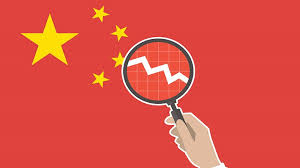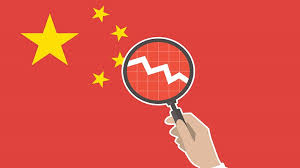
As rising inflation stifled international demand, new COVID restrictions impeded output, and heatwaves interrupted exports and imports, China's exports and imports lost steam in August, and consequently rate of growth missed predictions. This revived downside risks for the fragile economy.
According to official data released on Wednesday, exports increased 7.1 per cent in August compared to the previous year, decelerating from a boost of 18.0 per cent in July and the first downturn since April. This was significantly less than analysts' expectations of a 12.8 per cent increase.
Although exports have fared better than other economic drivers so far this year, they now face greater difficulties as geopolitical unrest, inflation, and rising interest rates choke off foreign demand.
The unimpressive August trade figures shook the world's financial markets, which were already trembling due to the strengthening dollar and the possibility of significantly higher US interest rates.
"It seems the export softness arrived in earlier than expected, as recent shipping data suggests that demand from the U.S. and EU has already slowed as shipping prices have been falling significantly," said Zhou Hao, chief economist at Guotai Junan International.
The depressing data prompted China's yuan to continue its downward trend, losing 0.36 per cent to 6.98 per dollar and moving closer to the psychologically significant 7 level. View More
The weakening yuan hasn't given China's exports the competitive edge they need to offset waning global demand, despite hovering around two-year lows.
In addition to less flattering comparisons to the robust exports of the previous year, the slower growth was also made worse by additional COVID restrictions as infections spiked and heatwaves disrupted factory output in the southwest.
Early in August, the export hub Yiwu implemented a three-day lockdown to control a COVID outbreak, disrupting local shipments and the delivery of Christmas goods during the busiest time of the year.
According to calculations by Reuters based on customs data, auto exports remained strong in August, increasing 47 per cent from a year earlier, defying the general trend.
China exported 1.9 million automobiles in the first eight months, an increase of 44.5 per cent, helped by Southeast Asia's significant demand for new energy vehicles.
Imports were hampered by weak domestic demand, which was weighed down by the worst heatwaves in decades, a real estate crisis, and lax consumption.
Only 0.3 per cent of inbound shipments increased in August compared to 2.3 per cent the month before, far less than the predicted 1.1 per cent increase. The growth of both imports and exports slowed to its lowest level in four months.
China's imports of crude oil, iron ore, and soybeans all decreased as domestic production was hampered by the strict COVID restrictions and extreme heat.
The fastest growth in coal imports this year, however, was caused by baking temperatures as power plants rushed to find more fuel to keep up with the surge in demand for electricity.
"The remarkably slower imports growth indicated the sector has faced a wave of headwinds in recent months, which is not expected to ease anytime soon," said Bruce Pang, a chief economist at Jones Lang Lasalle.
"COVID outbreaks disrupted supply chains and demand, while the power rationing measures hurt production. The broad dollar strength also brings pressure on imports."
This resulted in a smaller trade surplus of $79.39 billion, down from a record surplus of $101.26 billion in July, when Shanghai was coming out of lockdowns.
This week, Chinese policymakers expressed a renewed sense of urgency to support the economy, saying that the coming quarter would be critical for taking action as data indicates a further loss of economic momentum. View More
In an effort to stop the recent declines in the yuan, the central bank announced on Monday that it would reduce the amount of foreign exchange reserves that financial institutions must hold.
(Source:www.business-standard.com)
According to official data released on Wednesday, exports increased 7.1 per cent in August compared to the previous year, decelerating from a boost of 18.0 per cent in July and the first downturn since April. This was significantly less than analysts' expectations of a 12.8 per cent increase.
Although exports have fared better than other economic drivers so far this year, they now face greater difficulties as geopolitical unrest, inflation, and rising interest rates choke off foreign demand.
The unimpressive August trade figures shook the world's financial markets, which were already trembling due to the strengthening dollar and the possibility of significantly higher US interest rates.
"It seems the export softness arrived in earlier than expected, as recent shipping data suggests that demand from the U.S. and EU has already slowed as shipping prices have been falling significantly," said Zhou Hao, chief economist at Guotai Junan International.
The depressing data prompted China's yuan to continue its downward trend, losing 0.36 per cent to 6.98 per dollar and moving closer to the psychologically significant 7 level. View More
The weakening yuan hasn't given China's exports the competitive edge they need to offset waning global demand, despite hovering around two-year lows.
In addition to less flattering comparisons to the robust exports of the previous year, the slower growth was also made worse by additional COVID restrictions as infections spiked and heatwaves disrupted factory output in the southwest.
Early in August, the export hub Yiwu implemented a three-day lockdown to control a COVID outbreak, disrupting local shipments and the delivery of Christmas goods during the busiest time of the year.
According to calculations by Reuters based on customs data, auto exports remained strong in August, increasing 47 per cent from a year earlier, defying the general trend.
China exported 1.9 million automobiles in the first eight months, an increase of 44.5 per cent, helped by Southeast Asia's significant demand for new energy vehicles.
Imports were hampered by weak domestic demand, which was weighed down by the worst heatwaves in decades, a real estate crisis, and lax consumption.
Only 0.3 per cent of inbound shipments increased in August compared to 2.3 per cent the month before, far less than the predicted 1.1 per cent increase. The growth of both imports and exports slowed to its lowest level in four months.
China's imports of crude oil, iron ore, and soybeans all decreased as domestic production was hampered by the strict COVID restrictions and extreme heat.
The fastest growth in coal imports this year, however, was caused by baking temperatures as power plants rushed to find more fuel to keep up with the surge in demand for electricity.
"The remarkably slower imports growth indicated the sector has faced a wave of headwinds in recent months, which is not expected to ease anytime soon," said Bruce Pang, a chief economist at Jones Lang Lasalle.
"COVID outbreaks disrupted supply chains and demand, while the power rationing measures hurt production. The broad dollar strength also brings pressure on imports."
This resulted in a smaller trade surplus of $79.39 billion, down from a record surplus of $101.26 billion in July, when Shanghai was coming out of lockdowns.
This week, Chinese policymakers expressed a renewed sense of urgency to support the economy, saying that the coming quarter would be critical for taking action as data indicates a further loss of economic momentum. View More
In an effort to stop the recent declines in the yuan, the central bank announced on Monday that it would reduce the amount of foreign exchange reserves that financial institutions must hold.
(Source:www.business-standard.com)





